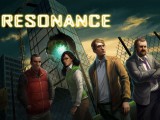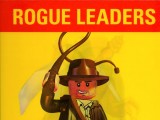Out of all the highly esteemed indie adventure games in the Wadjet Eye Games catalogue, Vince Twelve’s Resonance had by far the longest journey from start to finish.
Though intended for commercial release from the get-go, the game was announced in low-key fashion on the Adventure Game Studio forums in 2008, and then later Kickstarted in 2009, long before the “Double Fine” explosion of 2012, back when the landscape and prospects were vastly different. By the Kickstarter campaign, however, the game had already been in the works for over 2 years!
As with their other recent offerings, in Primordia and Gemini Rue, Wadjet Eye’s Dave Gilbert swooped to XII Games‘ aid to make finishing Twelve’s project a reality. With good reason: It’s no secret, by now, that Resonance is a very good game - one of 2012’s best adventures.
If anything, Resonance must be the most lapidary, evenly-spread, thought-out game in the already excellent Wadjet Eye publishing catalogue. To wit: If making games were a performance, Resonance would be as flawless a take as it gets. Hitting all the right notes, or perfecting a choreography doesn’t necessarily mean that you’re the very best, however: Little blemishes here and imperfections there can, after all, give a video game a little bit of that special “charm” or “character” that makes it ultimately more memorable. Resonance’s character, in this way, is cool and collected.
Resonance’s major selling point is Twelve’s original take on discourse and puzzles: A simple interface, for storing and recollecting both long- (LTM) and short-term (STM) memories, adds the ability for the game’s characters to “remember” hotspots, which can then be later “recalled” in discussion. Using the system comes to the player very naturally, and slightly resembles the parsers of text adventures of yore, only with a little less trial and error.
 For example, should you want to introduce a specific painting to a person (on the left), you’ll simply store the painting in one of your character’s short-term memory banks, and then take it up with the person you need to discuss it with. This is the way in which most puzzles are in fact solved in Resonance - that is to say, in addition to a fair bit of inventory management and some cleverly orchestrated specialized puzzles and events, some more time-sensitive than others.
For example, should you want to introduce a specific painting to a person (on the left), you’ll simply store the painting in one of your character’s short-term memory banks, and then take it up with the person you need to discuss it with. This is the way in which most puzzles are in fact solved in Resonance - that is to say, in addition to a fair bit of inventory management and some cleverly orchestrated specialized puzzles and events, some more time-sensitive than others.
Each memory, short and long, can be discussed with everybody in the game. Theoretically, different characters all give a different response to everything, though Twelve has noted the Resonance team “could have spent another two years just filling in extra text”1.
 The system also means that all four lead characters in the game have differing long-term memories, which play an equally large a part in the game. They also have access to very different circles and walks of life: Detective Bennet, for instance (on the right), has law enforcement resources at hand, while Anna Castellanos’ position as a health care professional opens up some doors at the local hospital.
The system also means that all four lead characters in the game have differing long-term memories, which play an equally large a part in the game. They also have access to very different circles and walks of life: Detective Bennet, for instance (on the right), has law enforcement resources at hand, while Anna Castellanos’ position as a health care professional opens up some doors at the local hospital.
Each of the four controllable characters plays an integral part in the game’s storyline. As generic as the cast seems to be at first, with Anna Castellanos the sensitive, downtrodden soul, Tolstoy Eddings the introverted and clumsy science type, Winston Bennet the boisterous, hard-boiled detective and Raymond Abbott the untrustworthy journalist, their stereotypes are later somewhat adjusted, tinkered and even toyed with, to the point of reaching a rather fully-formed feel.
 Resonance is very much at its best when Twelve gets to reveal tiny little cracks - moments of foreboding, or inner turmoil - in the surface personalities of the cast. Though much of the game is spent racing and pacing quickly from one objective to another, when time finally stands still just for a moment, and you get some real tangible access to the inner workings of the characters, the game really shines.
Resonance is very much at its best when Twelve gets to reveal tiny little cracks - moments of foreboding, or inner turmoil - in the surface personalities of the cast. Though much of the game is spent racing and pacing quickly from one objective to another, when time finally stands still just for a moment, and you get some real tangible access to the inner workings of the characters, the game really shines.
“Racing” above should be understood (mostly!) in positive light; it simply means that Resonance’s puzzles are integrally woven into the game’s narrative as it progresses. Barely anything in the game is done without due cause or reason, and actions feel strongly motivated by inner logic (one of Castellano’s puzzles at the hospital especially so). The kind of antisocial plunder and theft that often mars adventure games is reduced to its bare minimum, which gives the game a very realistic feel.
In fact, much of the puzzle-solving in the game is not so much spent on coming up with solutions, but rather figuring out how to best convey them to the characters via use of the memory system. In this way, the game can feel a little on the easy side - players should nearly always feel completely in control - with frustration stemming only from your own failure to implement a particular solution. A few of the puzzles have alternate solutions, too, some of which award achievements.
Resonance does feel like it loses some momentum around its middle part, given that everything happens quickly at first; once the game begins to branch out, and more locations to visit open up, it takes a while for the game’s narrative to catch up again. Around here, Resonance also contains by far the most elaborate and lavish item retrieval puzzle that I have ever had the pleasure of solving. This multi-stage puzzle is ultimately resolved by organizing a highly complex series of actions using three(!) of the four characters. I actually found myself wondering whether I’d ever seen a “hard”, prolonged puzzle of this kind that I’d have felt satisfied in solving. Perhaps this was it?
No amount of polish, however, could have ever streamlined the complexity that comes with having four different main characters, each with separate memories and inventories of their own. This aspect of the game necessarily results in a fair bit of juggling items back and forth between the cast. It also means players need a good short-term memory of their own: “Whose memory was that? Who’s carrying what?” A fair bit of repetition and redundancy, at least for me, were the end result of this particular problem. 
 Truthfully, a majority of the game’s puzzles could have very well been implemented conventionally, sans Twelve’s memories; at its core, Resonance is not paradigmatically different from other adventures, even if the memory system does give players a more vivid sense of interaction and exchange between the characters in the game.
Truthfully, a majority of the game’s puzzles could have very well been implemented conventionally, sans Twelve’s memories; at its core, Resonance is not paradigmatically different from other adventures, even if the memory system does give players a more vivid sense of interaction and exchange between the characters in the game.
No, the system is not the kind of quantum leap in adventure gaming that it might have - could have - been, but it still succeeds in giving the game a unique feel. I’m not sure, however, whether this is ultimately testament to the system itself, or rather Twelve’s major commitment and attention to detail. The few times that you do witness the memory system uniquely at work, though, seems to justify the game’s long development time, and also give the game a distinct sense of the new.
 So far, I’ve mentioned nothing of the game’s audiovisuals, which too have a great deal of finesse and detail. From lead artist Shane Stevens’ detailed sprite work and animations to Nauris Krauze’s backdrops and Nikolas Sideris’ background music, the game oozes workmanlike aesthetic sense. Birds swoop up and down, smoke lingers beautifully in the distance, electric particles sizzle and fizzle.
So far, I’ve mentioned nothing of the game’s audiovisuals, which too have a great deal of finesse and detail. From lead artist Shane Stevens’ detailed sprite work and animations to Nauris Krauze’s backdrops and Nikolas Sideris’ background music, the game oozes workmanlike aesthetic sense. Birds swoop up and down, smoke lingers beautifully in the distance, electric particles sizzle and fizzle.
Edward Bauer (Ed), Sarah Elmaleh (Anna), Daryl Lathon (Ray) and Logan Cunningham (Bennet, he of Bastion) are all well-cast; only the executive decision to not vocalize the cast’s inner thoughts befuddles, as the abrupt switches from speech and silence can be somewhat jarring, especially in the beginning.
To summarize: When have we last witnessed a game that was exactly the sum of its parts - nothing more, nothing less? Resonance is that game:
1x workmanlike writing and design
1x unique UI twist
1x sensible audiovisual direction
2x obsessive-compulsive quality control
= 1x one of the best indie adventure games both in my STM and LTM.
Indie adventure games are often an acquired taste - diamonds in the rough. Resonance, then, is as cut as a gemstone can be.
Resonance is available now, on Wadjet Eye Games, Steam and GOG.
- http://alternativemagazineonline.co.uk/2012/08/13/interview-in-conversation-with-vince-twelve-xii-games-resonance/ [↩]


@slowdownvg Great review, thanks guys!